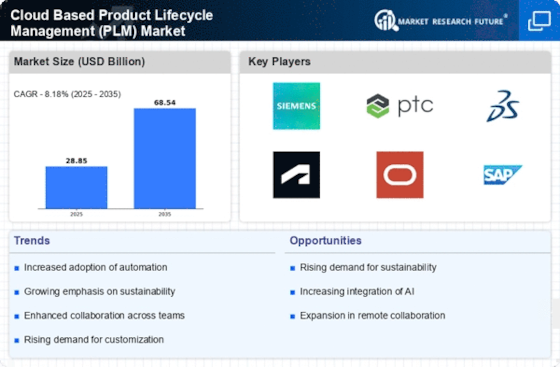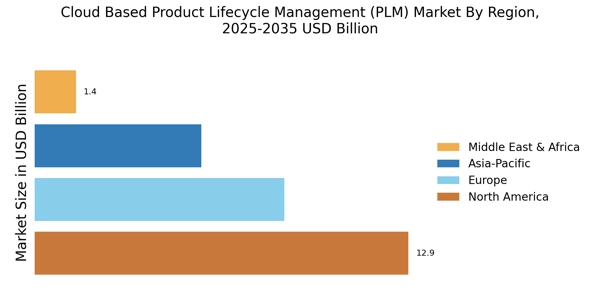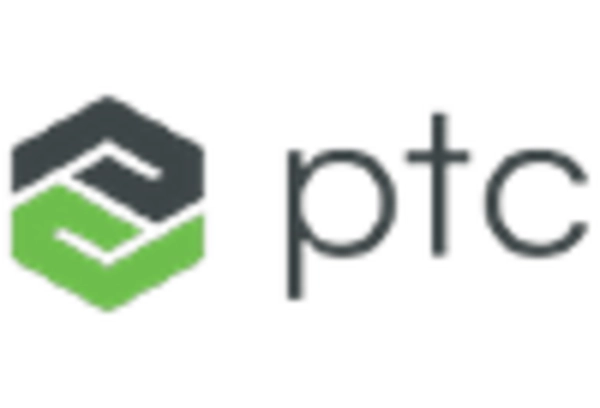Advancements in Cloud Technology
Advancements in cloud technology are significantly influencing the Cloud Based Product Lifecycle Management Market (PLM) Market. The evolution of cloud infrastructure has led to enhanced scalability, security, and accessibility of PLM solutions. Organizations are increasingly adopting cloud-based PLM systems to leverage these technological advancements, which allow for real-time updates and collaboration across teams. The market is projected to expand as companies recognize the benefits of cloud technology, including reduced IT costs and improved operational efficiency. Analysts predict that the adoption of cloud PLM solutions could increase by 25% in the coming years, driven by the need for agile and responsive product development processes.
Growing Importance of Data Analytics
Data analytics is emerging as a crucial driver within the Cloud Based Product Lifecycle Management Market (PLM) Market. Organizations are increasingly leveraging data-driven insights to optimize product development processes and enhance decision-making. The integration of advanced analytics tools into PLM systems allows companies to analyze vast amounts of data, leading to improved product quality and reduced time-to-market. Recent studies indicate that companies utilizing data analytics in their PLM strategies can achieve up to a 20% reduction in development costs. This trend underscores the necessity for PLM solutions that incorporate robust analytics capabilities, enabling businesses to stay ahead of market demands and consumer preferences.
Rising Focus on Regulatory Compliance
The Cloud Based Product Lifecycle Management Market (PLM) Market is witnessing a heightened focus on regulatory compliance. As industries face increasing scrutiny from regulatory bodies, companies are compelled to adopt PLM solutions that ensure adherence to various standards and regulations. This trend is particularly evident in sectors such as pharmaceuticals and aerospace, where compliance is critical. The demand for PLM systems that facilitate documentation, traceability, and reporting is on the rise, as organizations seek to mitigate risks associated with non-compliance. It is estimated that the market for compliance-driven PLM solutions could grow by 12% over the next few years, reflecting the importance of regulatory adherence in product development.
Emphasis on Innovation and Speed to Market
The Cloud Based Product Lifecycle Management Market (PLM) Market is characterized by an emphasis on innovation and speed to market. Companies are under constant pressure to deliver new products rapidly while maintaining high quality. This urgency drives the demand for PLM solutions that streamline workflows and enhance collaboration among teams. Organizations are increasingly investing in cloud-based PLM systems that facilitate faster product development cycles, enabling them to respond swiftly to market changes. It is estimated that businesses utilizing advanced PLM tools can reduce their time-to-market by up to 30%, highlighting the critical role of innovation in maintaining competitive advantage in today's fast-paced environment.
Increased Demand for Remote Work Solutions
The Cloud Based Product Lifecycle Management Market (PLM) Market is experiencing a surge in demand for remote work solutions. As organizations increasingly adopt flexible work arrangements, the need for cloud-based systems that facilitate collaboration and data sharing becomes paramount. This shift is evidenced by a projected growth rate of approximately 15% annually in the PLM sector, driven by the necessity for teams to access critical product data from various locations. Companies are seeking solutions that not only enhance productivity but also ensure seamless communication among stakeholders. The ability to manage product lifecycles remotely is becoming a key differentiator for businesses aiming to maintain competitiveness in a rapidly evolving market.

















